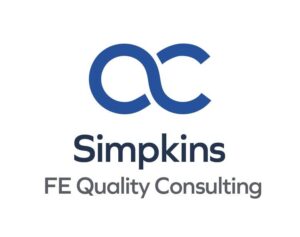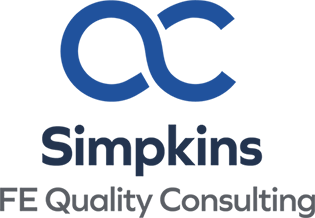
Why and when you should use a further education quality consultant?
In an education sector characterised by increasing demands for accountability, compliance, and learner success, institutions must continually assess and improve the quality of their provision.
The stakes are higher than ever, with quality impacting not just learner outcomes but also funding, partnerships, reputation, and the ability to thrive in a competitive sector. However, self-assessment can often fall short due to internal limitations such as bias, lack of resources, or insufficient expertise in specific areas. This is where a Further Education (FE) Quality Consultant steps in, offering an impartial, expert perspective that drives meaningful and measurable improvements.
Why use a further education quality consultant?
Objective and unbiased perspective
A consultant brings an essential external lens to assess your institution’s strengths and weaknesses. Unlike internal stakeholders, consultants are not influenced by institutional politics, personal agendas, or ingrained habits. This objectivity lets them scrutinise your processes, systems, and outcomes impartially, identifying blind spots that may go unnoticed internally. Impartial scrutiny is not only a best practice but also aligns with the expectations of regulatory bodies like Ofsted, which regard external evaluation as a marker of robust governance and accountability.
For example, a consultant might identify areas such as inconsistent assessment practices, lack of differentiation in teaching, or insufficient learner engagement, issues internal teams may find challenging to address due to proximity or sensitivity. By providing clear, unbiased recommendations, a consultant helps institutions take decisive action without the hindrance of internal conflicts.
Specialised expertise and broad sector knowledge
Further education quality consultants are typically professionals with extensive experience in the education sector. They bring deep knowledge of quality assurance frameworks, regulatory requirements, and emerging trends. Their exposure to diverse institutions equips them with the ability to benchmark your practices against sector standards and share best practices that may not yet be part of your institution’s toolkit.
For instance, consultants familiar with apprenticeship delivery might provide insights into designing effective on-program assessment strategies or aligning delivery models with employer expectations. Similarly, our expertise in new teaching technologies can help institutions integrate innovative tools to enhance learner engagement and outcomes.
Diagnosing and addressing systemic challenges
A quality consultant doesn’t just address superficial issues; they conduct a thorough analysis to uncover the root causes of challenges. This diagnostic process often involves deep dives into institutional data, learner feedback, and operational processes. For example, if learner outcomes have been declining, a consultant will analyse factors such as curriculum relevance, staff development needs, and learner support services to identify what’s driving the trends.
This comprehensive approach ensures that recommendations are reactive and preventive, equipping institutions to address current challenges while safeguarding against future risks.
Enhancing governance and strategic decision making
Governance plays a pivotal role in institutional success, and consultants often make invaluable contributions to advisory boards and senior leadership teams. Their external perspective brings clarity to strategic decisions, particularly in areas such as compliance, risk management, and long-term planning.
Institutions without effective governance frameworks risk poor outcomes during inspections, with Ofsted frequently highlighting weak governance as a factor in inadequate ratings. A consultant can help establish robust structures, facilitate clear accountability, and ensure decision-making aligns with quality improvement priorities.
Strengthening institutional reputation
The quality of education is directly tied to an institution’s reputation, influencing learner enrollment, partnerships, and external funding opportunities. Engaging a consultant demonstrates a commitment to excellence and continuous improvement, which can positively impact stakeholder confidence. By proactively addressing quality concerns, institutions can position themselves as leaders in their field and attract learners and collaborators.
When Should You Use a Further Education Quality Consultant?
There are several scenarios where engaging a quality consultant can provide substantial benefits.
Starting a new institution or provision
When launching a new institution or program, ensuring that systems and processes are designed to support high-quality delivery is critical. A consultant can guide you in creating robust quality assurance frameworks, developing policies, and training staff to deliver consistent and effective teaching and learning. Starting strong reduces the risk of quality-related challenges later and establishes your institution as a credible and competitive provider from the outset.
Addressing a decline in quality
If performance metrics indicate declining learner outcomes, engagement rates, or satisfaction levels, swift action is necessary to reverse the trend. A consultant can help identify the causes of these declines, whether they stem from curriculum gaps, staff underperformance, or inadequate support services. By addressing these issues strategically, consultants enable institutions to recover and sustain their quality standards.
Expanding into new sectors or programs
Institutions often diversify by introducing new qualifications, apprenticeship standards, or sector-specific programs. While expansion is a growth opportunity, it also presents challenges in maintaining consistent quality. Consultants bring expertise in aligning these new initiatives with regulatory requirements, ensuring that delivery models and assessment practices meet high standards.
Preparing for inspections
Inspections are high-stakes events that can significantly impact an institution’s reputation and funding. A quality consultant provides critical support in preparing for inspections, from conducting mock inspections to identifying and addressing gaps in compliance. Their guidance ensures that institutions are inspection-ready and aligned with the expectations of frameworks like Ofsted’s Education Inspection Framework (EIF).
Responding to regulatory or funding pressures
In an environment where compliance with funding and regulatory requirements is non-negotiable, consultants can help institutions navigate complex mandates. Whether it’s aligning with apprenticeship funding rules or meeting the requirements of specialised inspection frameworks, their expertise mitigates risk and ensures smooth compliance.
The value of an impartial advisor
One of the most significant advantages of engaging a quality consultant is their ability to provide impartial scrutiny. Internal teams often struggle to step back and evaluate their practices objectively, particularly in areas tied to long-standing habits or contentious decisions. A consultant’s external perspective encourages institutions to confront uncomfortable truths, whether it’s underperforming programs, ineffective leadership, or resource allocation issues.
Impartial advisors also foster accountability at all levels of the organisation. Their recommendations are rooted in evidence and best practices, giving leadership teams the confidence to implement change decisively. This transparency is particularly valuable during inspections, where external validation strengthens the institution’s case for meeting or exceeding standards.
Driving long-term improvement
While consultants are often engaged to address specific challenges, their impact extends beyond immediate problem-solving. A skilled consultant builds institutional capacity by fostering a culture of continuous improvement. By engaging staff in the diagnostic and improvement processes, consultants ensure that teams have the tools and confidence to maintain quality independently.
This collaborative approach leaves a lasting legacy, transforming not just systems but also mindsets. Over time, institutions become more agile, innovative, and capable of responding to new challenges, ensuring that quality remains a cornerstone of their operations.
My expert opinion
In my expert opinion, the role of a Further Education Quality Consultant is indispensable for institutions striving for excellence in an increasingly complex and competitive sector. Whether addressing immediate challenges, preparing for inspections, or driving long-term transformation, their impartiality, expertise, and strategic guidance empower institutions to achieve and sustain the highest standards of quality.

Interested? Curious? Then book your FREE no-obligation consultation with me today! Fill out an enquiry form via the Contact Me tab.







